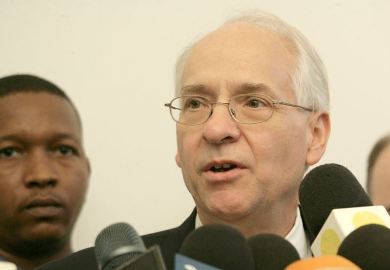Sudan refuses to meet US special envoy without agenda agreement
December 11, 2013 (KHARTOUM) – The Sudanese government ruled out receiving the United States special envoy Donald Booth again without first setting a clear agenda for his visit.

Al-Tom noted that dialogue through diplomatic channels between Khartoum and Washington has never stopped.
Asked whether Khartoum will reject the envoy’s visit in the absence of an agreement on the agenda, al-Tom said that they will cross that bridge when they get to it.
The Sudanese diplomat stressed that from now on there is no room for the traditional visits and meetings with officials to talk about the issues that were pre-agreed.
“What is required now from Washington is to address the concerns of the government to reach at a relationship based on interests,” al-Tom said.
Last week, Booth arrived in Khartoum and met with the head of the parliamentary subcommittee on foreign affairs, security, and defence, Mohamed Al-Hassan Al-Amin and according to state media discussed political and economic issues.
There were no indications that other meetings occurred with other Sudanese officials.
Ashorooq TV reported that the US charge d’affaires Joseph Stafford appealed to the Sudanese government to facilitate his visit which comes “in the framework of peace efforts”.
But al-Tom denied any mediation role by Stafford saying that the latter’s work is to facilitate and arrange and not to mediate.
Khartoum has reportedly delayed granting a visa to Booth saying that scheduling issues hampered their ability to arrange meetings for him with Sudanese officials.
However, the Sudanese foreign ministry denied media reports that the government has decided to suspend cooperation with him.
Last month, the Sudanese foreign minister Ali Karti offered rare praise of the US disclosing that it had played a significant role in the UN Human Rights Council’s (UNHRC) recent resolution which kept Sudan under agenda item 10 of technical assistance for another year, despite attempts by some parties to move Sudan back to agenda item 4 of monitoring.
“If the US hasn’t cooperated rigorously and clearly with Sudan, we wouldn’t have been able to move from item 4 to item 10”, Karti said
He thanked the US for its support, saying that Sudan must acknowledge the US position on this issue irrespective of the nature of relations between the two countries.
He said that the US role should help improving relations between Sudan and South Sudan rather than complicating the situation, adding that dialogue between the two countries should give priority to removing Sudan’s name from the list of the states sponsoring terrorism and lifting economic sanctions.
Washington imposed economic and trade sanctions on Sudan in 1997 in response to its alleged connection to terror networks and human rights abuses. In 2007, it strengthened the embargo, citing abuses in Darfur which it says constitutes genocide.
In 2010, however, the US government announced it was easing sanctions on agriculture equipment and services, which allowed half a dozen companies to obtain export licenses.
Sudan has also been on the US list of states that sponsor terrorism since 1993, even though the two countries have strengthened their counter-terrorism cooperation since the September 2001 attacks on Washington and New York.
Karti said he informed the US administration that reaching an understanding between the two countries requires a clear vision on the future prospects of relations, pointing to Sudan’s continued efforts to normalize ties, despite the US decision to renew economic sanctions for another year.
(ST)
